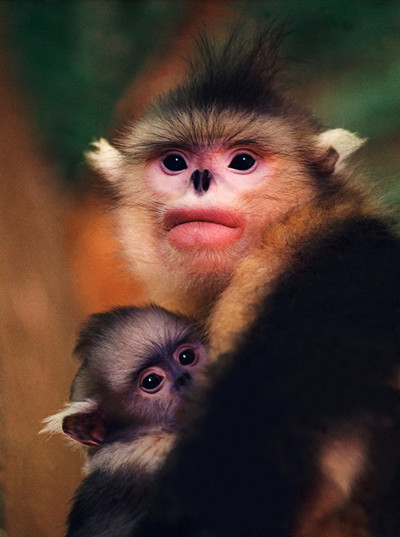Shooting for protection
- By Dolphin
 0 Comment(s)
0 Comment(s) Print
Print E-mail China Pictorial, September 4, 2013
E-mail China Pictorial, September 4, 2013
Xi and his partner rushed up the hillside, climbing 400 meters in only 20 minutes. Through the branches, he spotted a big male monkey sitting in a fir on the opposite slope, nibbling on lichens with ease as two females snuggled up to his side, babies in arms.
|
Yunnan Snub-nosed Monkey(Rhinopithecus bieti), Kunming,Yunnan,1995. [Photo/Xi Zhinong/WildChinaFilm] |
Sparing not an instant to wipe the tears from his eyes, Xi snatched his camera and began firing away. "It's been two years!" he thought to himself.
In May 1995, Xi Zhinong learned that the local government, plagued by financial troubles, decided to chop down 100 square kilometers of virgin forest in the Baima (White Horse) Snow Mountain Nature Reserve – home to the monkey as well as various other rare species of animals and plants.
Stunned, Xi sprinted around in circles to mobilize as many hands as he could to help protect the forest. Ultimately, he thwarted the chopping plan, but did so at the cost of losing his position in the forestry bureau. In
1996, Newsweek reported his story, praising his actions as a watershed moment for Chinese awareness of environmental protection.
Protection by Seeing
It has been centuries since shahtooshes were en vogue in the West. The major material for the shawls came from Tibetan antelope fur, which was dubbed "naturally deciduous" by merchants seeking big paydays for the exotic softness. Not until the late 1980s did George Schaller reveal to the public that the shahtoosh's delicate fabric was procured through brutal hunting, which specifically resulted in a dramatic drop in the population of Tibetan antelopes.
After bouncing around various media outlets, Xi eventually decided to work freelance. In December 1997, he was invited to visit Hoh Xil and join Wild Yak Team. He shocked China and the world with photos he captured in the freezing cold: tall piles of furs, vacant stares of dead antelope eyes, bullet holes in flesh, and bloody severed heads. His photos sparked nationwide campaigns to protect Tibetan antelopes. Some photos of skinned antelope carcasses were published in a foreign magazine with the caption, "Three to five antelope's lives pay for a shahtoosh."
Today, the population of Tibetan antelopes has stabilized thanks to efforts by people across all walks of life. None of it would have happened without visual images of the animals for the public to embrace.
"All of the animals – Tibetan antelopes and wild yaks from Hoh Xil, Yunnan snub-nosed monkeys from White Horse Snow Mountain, pandas deep in Qinling Mountain Range – gave me a chance, more or less, to capture their moments of terror, curiosity, peace, and tranquility," illustrated Xi. "In their eyes, I saw my own reflection and the selfishness and greed of humankind. I saw the depth of our naiveté about nature from these animals."
In 2002, Xi and his wife established a studio, Wild China Film, aiming to protect nature through images, primarily focusing on wild animals in China. After toiling away alone for many years, he eventually realized that his goals would never be achieved without joint efforts from many. He thus established Chinese Wildlife Photography Training Camp in 2004, which offers photography training programs for patrols of nature reserves throughout the country, in hopes of inspiring others to observe their environments from new angles.
Xi Zhinong and his wife were invited to speak at the British Royal Geographical Society's 2008 Wild Photos event, the first such appearance by a photographer from China. In 2012, Xi, along with several young Chinese photographers, attended Wild Photos again. Pictures of a bear farm in China taken by a British photographer chilled everyone in attendance. Xi thanked the British photographer for his concern for animal protection in China, and provided balance with his own shots of wild animals, which documented efforts by many to protect the beauty of nature.







Go to Forum >>0 Comment(s)